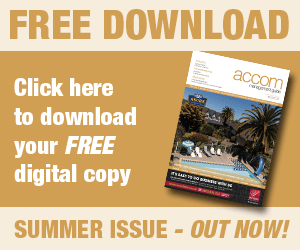Industry Well Catered for as Standards Rise
- Details
- Published Date
Rugby World Cup '11 was a big spur to training people to satisfy the demands of international diners.
Extra training courses run by a number of hotels and restaurants, the Hospitality Standards Institute and government funding for other courses ensured that New Zealand appeared to cope well with the influx of tourists, although that demand did not always happen in quite the places and ways expected. For instance, particularly outside the main centres, tourist accommodation was often bypassed as visitors preferred to park their camper van at the nearest camping ground and purchase most of their food from the local supermarket.
Several months on from that event, where do we stand with regard to skilled staff? The biggest organisation training students in hospitality is Auckland University of Technology and senior lecturer in the School of Hospitality and Tourism, David Williamson says at present the accommodation industry is well placed to find graduates well qualified to meet high standards. However, much depended on the rewards and conditions of employment they were offered. The pool of good employees is very fluid and can change rapidly, he said.
But at present he says it is a happy situation for those looking to hire. "Most of the HR managers I've talked to feel really good at present. They've got trained people, good numbers, and more people coming through the schools into the labour market who are looking for work. Employers are feeling pretty sweet I think."
On the other side of the ledger, Mr Williamson says it can be quite tough for graduates. "I think it is getting harder for them to get the roles they want. Our students are saying there's a lot of pressure on those roles. You've got to have the qualifications, the experience, and there's 50 people now applying for every good job. While the hotels and the employers are very happy they're getting good quality people, those entering the market have to be really clued up.
"I think it partly reflects the wider labour market. We still have reasonably high levels of unemployment and that injects a lot of people into some parts of the job market. Entry into hospitality is still considered a quite low skilled entry point."
For that and other reasons, he sees plenty of interest from young people wanting to take on hospitality courses. "We still have plenty of people signing up and we're producing good numbers of graduates. We have 600 on our International Bachelor of Hospitality Management programme which means 2 – 300 graduates coming out each year. Our Masters numbers are going up and diplomas still cranking along, so we're producing quite a few graduates at different levels for the industry. Employers are getting really good inputs. They built up a really good workforce before the World Cup so if anything, they've got a glut."
David Williamson says there are changes within accommodation hospitality that are creating opportunities at the upper level but not necessarily growing the number of job opportunities overall. "Groups like Accor have been expanding very quickly but generally this is into properties that are already up and running. They're turning them into brands, such as Sofitel and the Pullman, which are quite upmarket. In a way that's really good for our graduates who are highly skilled, with lots of experience and looking for that next level up. The message for those coming into the industry is that jobs are there but you really have got to have your head screwed on to get them."
However, while opportunities might be growing at the upper end of the market, it was much more competitive at the less skilled end, he said. AUT was now more aware that different establishments required different standards.
"We're constantly feeling that we have to respond to where the market's going. There's a real spread of levels now whereas before we used to think in terms of just 'the' industry. Each organisation as a brand has something quite different happening in it. For example, I know from my conversations with HR practitioners that they're starting to think less about Human Resource management Accor wide and more about brand-specific silos of HR, because who they want for the Mercures and how they train them and reward them is quite different from the requirements of a Pullman or Sofitel. We're becoming conscious of that and encouraging students to think more specifically about what type of career they want and where they want to go."
And although the picture for employers is a good one at present, he warns against any complacency. Hospitality is still a low wage economy with high turnover, either to other jobs in the industry, to completely different industries, or overseas where graduates can earn 20-30 per cent more in the same brands. "There's always a great number of our graduates who plan to go straight overseas off the back of their degree. Australia is still very attractive in terms of the wage differential."
He said motels with restaurants were likely to be in intense price competition with suburban restaurants where business is still in fairly recessionary times.
Brent Leslie


